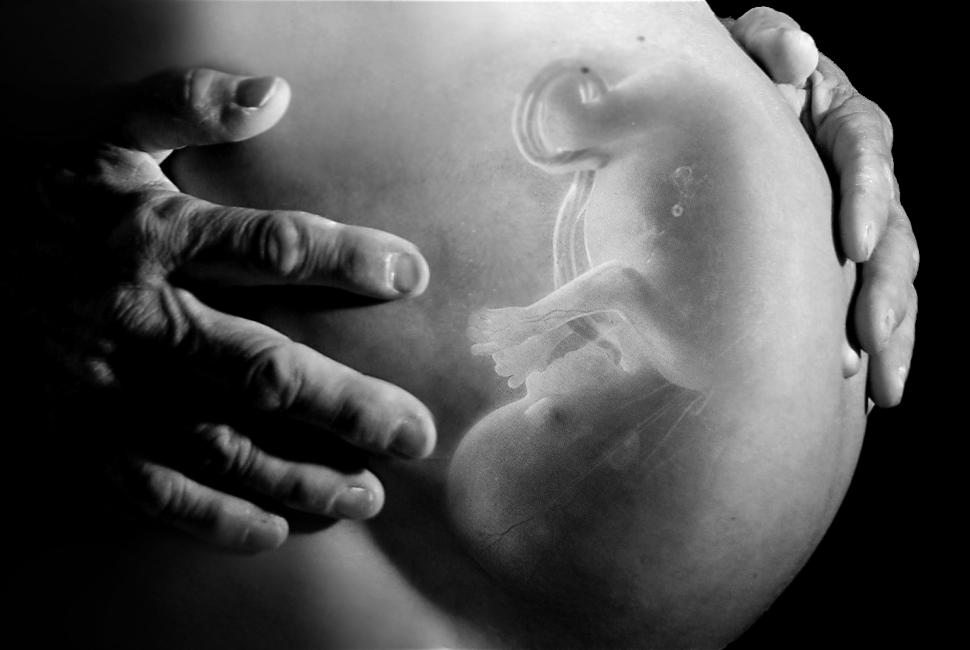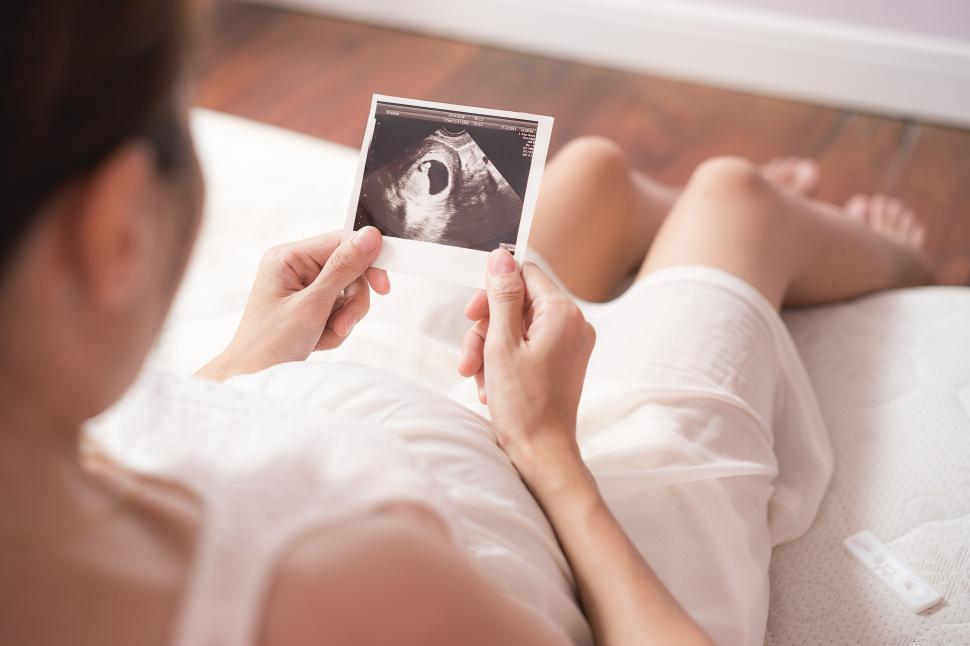Molar pregnancy symptoms which is also known as gestational trophoblastic disease(GTD) is a form of abnormal pregnancy.
Molar pregnancy symptoms appear when abnormal cells form placenta-like tissue develop into the uterus instead of a healthy baby.
Molar pregnancy vs normal pregnancy
A normal pregnancy happens when a sperm fertilizes an egg to form a fertilized egg that has 46 chromosomes.
The fertilized egg travels to the wall of the womb and implants.
In molar pregnancy there is an imbalance in the chromosomes (genetic material), and there is no fetus.
 Types of molar pregnancy
Types of molar pregnancy
Complete molar pregnancy
It happens when a sperm fertilizes an empty egg, there is no genetic material in the egg so the placenta is formed abnormally.
It contains tumors called fluid-filled cysts.
Molar pregnancy symptoms occur same as normal pregnancy symptoms because the pregnancy hormone HCG ( human chorionic gonadotropin) is produced.
Partial molar pregnancy
It happens when two sperm fertilize a normal egg to form an embryo that has 69 chromosomes instead of 46 chromosomes.
The fetus is incomplete and could never develop into a baby.
Molar pregnancy symptoms
Symptoms of molar pregnancy and normal pregnancy are the same, but the severity of molar pregnancy symptoms is much more.
The signs can include:
Missed period
The first sign of molar pregnancy is missing a period which is known by amenorrhoea.
Some women experience light bleeding and think it's the period but it is not.
High levels of Human Chorionic Gonadotropin (HCG)
High levels of HCG cause all molar pregnancy symptoms and make all the changes inside the pregnant body.
HCG hormone is exaggerated in molar pregnancy.
Irregular vaginal bleeding
Women with molar pregnancy symptoms get dark brown to bright red bleeding and watery brown vaginal discharge during the first three months.
Pieces of the molar tissue may be passed which can look like clusters of grapes (sacs).
Abdominal swelling
Women who have molar pregnancy symptoms get more swelling in the belly area than in a normal pregnancy.
Their tummy gets bigger more quickly.
Extreme bouts of nausea and vomiting
Nausea and vomiting are the most common symptoms of molar pregnancy.
Most women face morning sickness and loss of appetite.
They may experience these two signs throughout the day not only in the morning.
Fatigue
The huge increase in the sex hormone progesterone makes the pregnant more tired and unable to do her normal daily routine.
Progesterone slows the metabolism of the body.
But it's very important to thick the uterine lining and help the baby to grow.
Fatigue and tiredness make the pregnant woman want to sleep all day.
Breast changes
The breasts are highly affected by molar pregnancy, they become swollen, gender and fuller.
The veins of the breasts become more obvious and around the nipples become darker.
Frequent urination
Frequent Urination is one of most common molar pregnancy symptoms.
It may occur within weeks after conception due to the hormonal changes.
Frequent urination occurs because the levels of body fluids increase.
The growing uterus puts pressure on the bladder and the body gets rid of the waste quickly through the kidney.
Anemia
Anemia is a rare sign of molar pregnancy symptoms but it may occur.
Anemia means low red blood cells, it happens due to vaginal bleeding.
Heartburn
Reflux and heartburn is associated with molar pregnancy symptoms.
The progesterone hormone relaxes the muscle between the esophagus and the stomach.
This leads to the reflux of the stomach acid and pain.
Indigestion occurs due to the pressure of the growing uterus on the organs of the abdomen.
Mood changes
Molar pregnancy hormones release chemicals in the brain which cause mood changes.
Cysts in the ovaries
Ovarian cyst is a complication of molar pregnancy symptoms.
Hyperthyroidism
Molar pregnancy symptoms may be complicated, it may lead to overactive thyroid gland and thyrotoxicosis.
Signs of hyperthyroidism include fast heartbeat, sweating, and weight loss.
Preeclampsia (high blood pressure)
Molar pregnancy produces more anti-angiogenic proteins than normal pregnancy which leads to increase in blood pressure.
Pelvic pain
The pain in the pelvis happens due to the severe pressure in this area.

Molar pregnancy complications
Sepsis
It is a serious condition in which the blood gets infected followed by suppression of the immune system.
Choriocarcinoma
It is the most aggressive form, cancer cells could spread from the placenta to the body if the molar pregnancy symptoms got untreated.
Risk factors for molar pregnancy
Age
Age affects only in complete molar pregnancy, women -over 45 years- are more susceptible to complete molar pregnancy.
There is a small risk for molar pregnancy Symptoms in the young teenagers.
Ethnicity
Being of Asian descent makes you more liable to Molar pregnancy than others.
In Asian women, molar pregnancy is about twice as common compared to non Asian women.
In the UK, about 1 in 590 pregnancies is a Molar pregnancy.

How early can molar pregnancy be detected?
Molar pregnancy is diagnosed during the routine pregnancy scans and tests.
Urine and blood tests
Unpregnant women don't have human chorionic gonadotropin hormone (HCG hormone) in her blood, it's important for the baby to develop.
Once she becomes pregnant, the placenta releases HCG hormone.
In molar pregnancy, the percentage of the hormone is much higher than normal.
Abdominal ultrasound
Abdominal ultrasound is a good method to detect complete molar pregnancy in the 12th week.
Partial molar pregnancy is diagnosed by blood tests.
Abdominal ultrasound scan with high frequency waves puts a picture of a part of your body.
This scan takes up to 45 minutes.
Pregnant woman does this scan at 12 weeks to make sure there are no abnormalities.
In molar pregnancy, ultrasound waves show no fetus tissue and a characteristic “snowstorm appearance” on the scan.
Transvaginal ultrasound
Your doctor may ask you to do this if you have any earlier symptoms before your routine scan.
It is done internally to get a more detailed picture inside your vagina.
You may feel slightly uncomfortable while doing it but it doesn't hurt at all.
After abortion or miscarriage
After 3 weeks after abortion, your gynecologist may ask you to do a urine test to make sure that HCG levels have completely gone.
Treatment of molar pregnancy
As soon as you know you have molar pregnancy, you must remove it immediately.
You may get rid of it by surgery or through medications according to your doctor’s recommendations.
Treatment includes dilation and curettage (D&C) with suction to remove all the molar tissue.
It is a painful process so the patient got general anesthesia.
Is it important to monitor HCG levels after surgery ?
It is the only way to make sure that molar tissue is totally removed from your body.
You must monitor HCG levels regularly after the surgery.
Can molar pregnancy cause cancer later in life?
Molar pregnancy begins not cancerous benign ,but if the Molar cells are not removed well,they will develop to form cancerous cells.
It's a small risk to occur but it might happen.

How to prevent molar pregnancy?
There is no certain way to avoid molar pregnancy.
You can reduce the risk of molar pregnancy by avoiding the pregnancy for up to a year once you have had molar pregnancy.
Emotions and molar pregnancy
The miscarriage association suggests that the experience of molar pregnancy is associated with hard feelings including :
Confusion and shock
Molar pregnancy makes women very confused as the pregnant woman thinks she will finally have the baby she dreams of but this does not happen, she gets shocked and disappointed.
Anxiety and fear
Molar pregnancy may lead to the fear of getting cancer and the fear of experiencing molar pregnancy again in the future.
Loss and sadness
Feeling grief is normal for the baby you were expecting.
Feeling isolated and alone
Especially if there is no one around you knows what molar pregnancy is and you do not have the ability to tell him.
Unable to move on
You have to wait for at least one year before you become pregnant again.
It is an important step to prevent molar pregnancy from occurring again.
In conclusion, experiencing molar pregnancy is very hard and stressful but it is very rare.
It happens by chance, about 1 pregnant in every 700 will be a molar pregnancy.
If you get molar pregnancy symptoms one day, telling your partner is important for your mental health.
Follow up with your doctor is essential to make sure all the fetal tissues are away from your body.


You must be logged in to post a comment.